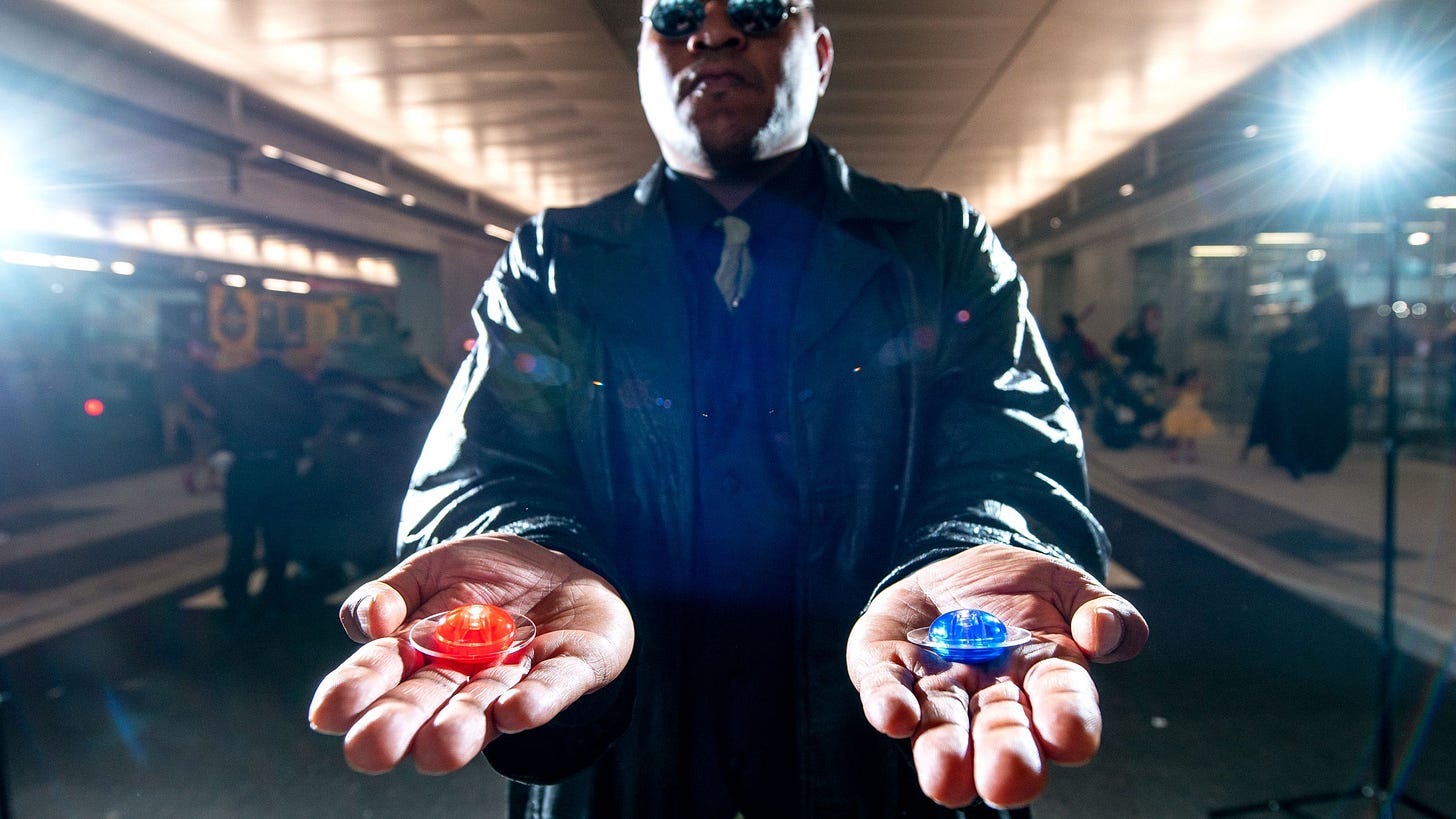77,237,942 Americans Can Be Wrong
“There’s a really annoying trend in political analysis where the voters cannot fail, they can only be failed”
Welcome to the weekend edition of The Experiment, your official hopepunk newsletter. If you’d like to support my work, become a paid subscriber or check out the options below. But even if you don’t, this bugga free. Thanks for reading!
What if I told you that Kamala Harris ran an improbably good campaign?
Shortly after the election, longtime political consultant and recovering Republican Matthew Dowd quietly stated that, scoreboard notwithstanding, Harris in fact did far better than anyone could have expected. Looking only at modern elections, Dowd found that “no president running for re-election in modern times or vice-president running under the incumbent party, has received a higher number than the incumbent President’s job approval number!”
Until Kamala. Joe Biden has averaged a job approval rating as president of 42%. In November, it dipped to 37%. The Harris-Walz ticket got 48.4%, over performing the historical trend by 11.4%. Sometimes good campaigns lose.
Sometimes good campaigns lose.
I haven’t wanted to bring this up because it’s an opinion that runs counter to the overwhelming consensus in the Hot Take Industrial Complex. The easiest way to place an op-ed these days is to offer an analysis of what Harris should have done and to condemn her team for not apologizing for what they did do. And, also, she lost. It offends the sensibilities of the chattering class to suggest that she ran an improbably good campaign. They want to assign blame to her, to agree upon a diagnosis and offer prescriptions that uniformly conform with what they’ve been saying all along.1
It’s hard to avoid these opinions. They’ve metastasized on news apps, so I’ve retreated to entertainment podcasts and crosswords. I thought If Books Could Kill was a safe space. The podcast eviscerates airport books such as Who Moved My Cheese?, The World is Flat, and Rich Dad, Poor Dad. It’s a lot of fun to hear co-hosts Michael Hobbes and Peter Shamshiri take turns pointing out the fallacies and inaccuracies that underpin the books that initially convinced us they were so smart. So when their latest episode examined What’s the Matter with Kansas?, the George W. Bush-era political book, I thought I was in for that kind of “Oh, I didn’t think of it that way!” fun.
I was not.
Hobbes and Shamshiri were discussing the prevailing reluctance to admit that racism might be a motivating factor in the drift of white working class voters, especially in the South, to the Republican Party since the ‘60s when Shamshiri articulated something I’ve been reluctant to accept.
“There’s a really annoying trend in political analysis where the voters cannot fail, they can only be failed,” he said. “So if you’re like David Brooks, when voters choose a Republican, the Democrats must have done something incredibly wrong.”
Shamshiri threw up the glaring caveat that if you are in the business of getting people to vote for Democratic candidates that you’d be well-advised to look for mistakes and ways to improve. “But I don’t see why that precludes analysts, like pundits, from just criticizing the electorate, being like, they f*cked up on this one.”
More to the point, 77,237,942 Americans made a monumental mistake, and one that was pretty easy to avoid. This is, in fact, the same Donald Trump as the one who presided over four chaotic years not too long ago. Remember the time Donald Trump had the police violently clear a peaceful protest so he could pose with a Bible outside a church? Remember when he told us to inject bleach, or when he bragged about acing a test for dementia? Remember “some very fine people on both sides”? Remember Jan. 6? Well, this might come as a surprise, but that’s the same guy they voted for this time.
“So if you’re like David Brooks, when voters choose a Republican, the Democrats must have done something incredibly wrong.”
And why? The Trump campaign put all its chips on scaring voters about trans athletes, spending $215 million on network TV ads alone on the subject, more than they spent on campaign commercials about the economy or immigration. There are about half a million college athletes, less than 40 of whom are trans. It’s almost hard to imagine thinking that a trans volleyball player for Kanarberaska State is a problem in the first place, much less one that should influence a vote for President of the United States of America.
So, yeah, 77,237,942 Americans are ultimately to blame. But that does not absolve me, because the diagnosis begs a prescription. I will never forgive them, but I physically can’t stay mind-stutteringly angry at them for the rest of my life. No, that’s not right. I am enraged. My children’s children will have to deal with the rubble this man will leave. But I have to live through the present, and I cannot physically endure being this angry at 77,237,942 Americans, some of whom I love very much.
What is an honest, ethical, and productive way to accept the reality of 77,237,942 Americans who knowingly voted to rehire Donald Trump?
***
In another attempt at seeking a safe space for my attention, I clicked on David Marchese’s interview with actress Tilda Swinton in The New York Times Magazine. (Many of the words in that last sentence are cultural signifier Yahtzee. I regret nothing.) I expected some Swinton-level weirdness swirled with Marchese’s self-aware curiosity, and I was not disappointed when their conversation puzzled over the “potential efficacy of art.” Heady stuff, but not unwelcome.
Swinton made something of a thesis statement that the point of art is to “call to our innate goodness” before linking that to her theory of what motivated those 77,237,942 Americans: meanness born of childhood fears.
I wonder whether art isn’t a call to our innate goodness — an opportunity to connect with the empathy machine that cinema is. That M&M, Diet Coke place in the dark is an invitation to step into other people’s shoes. It’s such a massive gesture of agape, isn’t it? I wonder — I’m seeing you and raising you — about people’s innate goodness. Since you mentioned Nov. 5, and we’ve talked about the rise of the meanness of right-wing politics — let’s use a word that is appropriate here: meanness. What oil might get through that grease? How might one be able to reconnect with the innate goodness? I don’t want to assume that anybody else believes in innate goodness, but I’m declaring that I do. I do believe we were all little children, scared little animals once, including all of those people that we’re thinking about. I don’t know what happened to them to make them this mean, but we have to contact them somehow.
Marchese and Swinton chewed over what constituted innate goodness in art and whether art that portrayed evil helped us access that goodness before Marchese returned to the idea of meanness.
“You pointed to a meanness in the world, and suggested that the purveyors of that meanness were once vulnerable little children,” he began.
“Still are, whether they tell us or not,” she interrupted.
“So having awareness of the meanness in the world and that the people who are mean are vulnerable little children — that could elicit what productive response?” he asked.
“I suppose it’s about trying to not give up on the possibility of connection between people,” she answered. “There’s this tendency in the far right to encourage us to give up on human connection and entirely be self-serving. How do we go into some kind of negotiation with that? Do we just give up? They would love us to give up on trying to reach some kind of agreement. We just have to find agreements now.”
“Still are, whether they tell us or not.”
Taking political advice from a Scottish actress might be a bad idea, but her call for empathy as a way to relate to 77,237,942 Americans is not dissimilar to Mark 12:31, one of the two greatest commandments in the Christian religion: “Love your neighbor as yourself.” I checked, and there isn’t an asterisk. Nowhere does it say that we have to agree with them or meet them halfway, and we’re talking about neighbors, so good boundaries are implied. By the same token, it doesn’t say that we love them only if they love and accept us.
Think of the 77,237,942 Americans as vulnerable little children who just screwed up big time. Now, take a big breath, and let it out slowly. We can either spend the next four years telling them they’re idiots who just made a massive, history-altering mistake, or we can start trying to find some kind of agreement. At a time like this, love is the most hopepunk thing of all.
Jason Stanford is a co-author of NYT-best selling Forget the Alamo: The Rise and Fall of an American Myth. His bylines have appeared in the Washington Post, Time, and Texas Monthly, among others. Follow him on Threads at @jasonstanford, or email him at jason31170@gmail.com.
Further Reading
"Dude, there was a mom in the mosh pit!"
Remember back in June when I told you how I thought my youngest son was just asking for money to buy concert tickets but was really inviting me to go with him (and pay, of course)? Well, this week we went, and it showed me so much about how his generation relates to the culture. If you usually skip “What I’m listening to” or are new to the newsletter,
It Gets Easier
Welcome to The Experiment, where we’re moving to a Sunday morning delivery because the day job doesn’t leave enough time to write this until the weekend. This week, I visit my oldest son at college as we mark 100 days of the Biden administration. Jessie Daniels
We set up a merch table in the back where you can get T-shirts, coffee mugs, and even tote bags now. Show the world that you’re part of The Experiment.
Buy the book Texas Lt. Gov. Dan Patrick banned from the Bullock Texas History Museum: Forget the Alamo: The Rise and Fall of the American Myth by Bryan Burrough, Chris Tomlinson, and myself is out from Penguin Random House. The New York Times bestseller is out in paperback now!
See also: Bernie Sanders.







So great. Thank you. I live out in the country among The Red People. They are good neighbors and help me. I am a good neighbor and help them. We never ever talk politics. The weather is interesting and safe enough for conversation.
Kamala's campaign wasn't perfect, to be sure. https://www.nytimes.com/2024/12/07/us/politics/harris-philadelphia-black-latino-voters.html?unlocked_article_code=1.f04.0SJM.C9JEsorNiSSM&smid=url-share